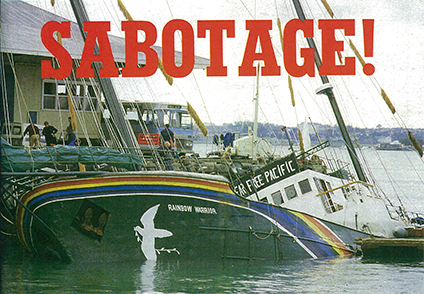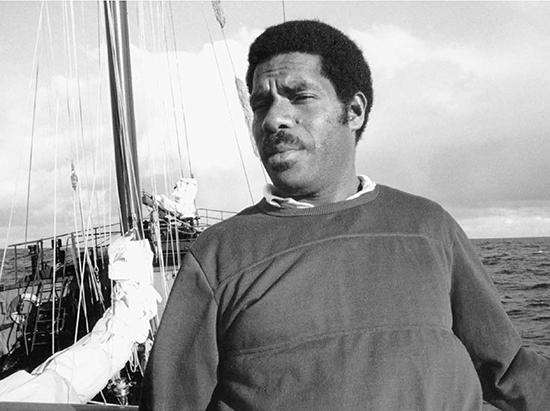
Len Garae
PORT VILA (Vanuatu Daily Post/Pacific Media Watch): BACKGROUNDER: On the night of 10 July 1985, three decades ago, the Vanuatu government representative on board the Greenpeace flagship Rainbow Warrior, Charles Rara, was on shore leave with Baldwin Lonsdale - current Head of State.
He was staying at his home at St John's Theological College in Auckland, where President Lonsdale was then doing his studies.
Captain Pete Willcox and some of his crew were already asleep on board the campaign ship.
Rara's cabin mate, Portuguese-born Dutch photographer Fernando Pereira, and a few others were still chatting around the mess-room, sharing between them the last two bottles of beer. Suddenly the lights went out. There was a sharp crack of breaking glass. Then a sudden roar of water.
The crew’s first thought: We’ve been hit, possibly by a tug boat.
Then, there was a second explosion. One of the two bombs had torn a gaping hole in the cabin which Rara and Pereira shared.
This was how the bombing happened to the Rainbow Warrior after her passage from Port Vila Harbour, where Rara boarded the ship when she set sail for Auckland bound for Moruroa Atoll in French Polynesia to protest against France's nuclear testing in the Pacific.
A banner calling for a total ban of nuclear testing and a "Nuclear-free Pacific" was drawn up in Port Vila following a regional meeting by governments and NGOs from around the Pacific that was held in Port Vila two years earlier.
The following is a first hand report of the suspense and trauma Vanuatu's Rara family experienced in their quiet village at La Bwaru in North Pentecost.
Their only connection to the outside world at that time was Radio Vanuatu.
This is how Charles' younger brother, Patrick Rara, tells it:
Silence followed bombing
The moment we heard on the radio that the Rainbow Warrior was bombed and sunk by French secret agents in Auckland Harbour, silence fell over our home. Nothing was said pf the fate of my brother or the crew."Our mother and Charles' wife, from Isabel in the Solomon Islands, were the only two crying.
"I was the second-last born in the family.
"We all kept our ears close to the radio to hear the next news. It was hard to take; it was too far away to understand what life was like over there.
"Why would somebody want to bomb a ship, let alone the Rainbow Warrior?"International politics and military sabotage were strange to our ears in our village, but not to my brother. Charles understood such extreme behaviour, especially if it were connected to France.
"The French at the time did not see eye to eye with Vanuatu because people protested in Port Vila against Paris for its nuclear testing near Tahiti.
Test in France
"They argued that if the testing was safe then French nuclear scientists should test their nuclear bomb on mainland France and not on a faraway Pacific atoll."When the Rainbow Warrior dropped anchor in Auckland Harbour, my brother was overjoyed that someone knew him in the strange city.
"It was Baldwyn Lonsdale who went to school with him in the Solomon Islands. Baldwin took him to his house where they stayed and chatted and had lunch and continued until supper.
"After supper, Charles said their stories became 'so sweet' he had to stay the night.
"Charles said God was good to keep him from the ship or he would have been bombed to death in his cabin.
"Charles returned to the wharf in the morning and it was teeming with security. He did not understand a thing and forced his way through the throng of people but could not see the glorious Rainbow Warrior, where it was anchored.
"Someone whispered to him the most frightening news that it was bombed and had sunk to the bottom of the harbour.
"Nobody could understand it then that the French had ordered the sabotage.
Terrorist act
"But for Charles, he told us that his immediate guess at the time - and he blurted it out - was that it was the work of the French, that Frenchmen would go to that extreme to commit such a terrorist act in peaceful Auckland."As a first time arrival in Auckland, Rara asked where his colleagues were and he was taken to them.
"He said, 'When they saw me, they burst out crying, knowing that it was the end of the journey because there was no Rainbow Warrior to take us to challenge the French Navy blockade at the nuclear tesating site.
"Charles said they had been fully briefed by the American captain [Pete Willcox] of the Rainbow Warrior to follow his instructions, and not make any mistake because they were going to evade the French Navy blockade to enter the restricted zone.
"But for my brother, it was just the start of his trauma because Auckland police caught up with him and arrested him on suspicion that he might have known of the bombing, thus his spending the night ashore with his friend.
"Police interrogated him at the police station for the whole day until he convinced them that he grew up in Vanuatu and he knew the French attitude towards ni-Vanuatu regarding their nuclear testing activities.
"He reminded them that he had lived with the French all his life and the French (and British) had controlled Vanuatu for 74 years until Vanuatu became independent on 30 July 1980.
Lost everything
"Satisfied, the police took him back to the hotel where the crew were now staying."The crew lost everything, including their travel documents, so they were provided with clothes and shoes by the Red Cross and finally they were flown back to their respective countries.
"You see, the Rainbow Warrior had an international crew from around the world.
"Once he returned safely to Vanuatu, Charles said he was appointed by Walter Lini's Vanua'aku Pati government to represent Vanuatu's young nationalistic call for a Nuclear-Free Pacific on the ship.
"He said he was issued with a 'Red Passport', a diplomatic passport to prove that he was not an ordinary man and that if anything should happen to him then those who found his passport would know who he was."
Charles Rara had five children, three boys and two girls. He has since died, leaving behind his wife and children who are now in her native Solomon Islands.
Patrick, who is now 53 years old, says his brother was a man with unique, silent qualities that allowed his actions to speak for him .
Charles was close to Father Walter Lini. He heard Father Lini's famous utterance that Vanuatu would not be fully free until all colonised countries in the Pacific were free from colonial rule.
Asked if his brother Charles was acknowledged for his brave stand to the might of super power arrogance, Patrick Rara shook his head without saying anything.
Finally, the French ended their nuclear testing at Moruroa Atoll in 1996.
Len Garae is a senior journalist with the Vanuatu Daily Post.

This work is licensed under a Creative Commons Attribution-NonCommercial 3.0 New Zealand Licence.




